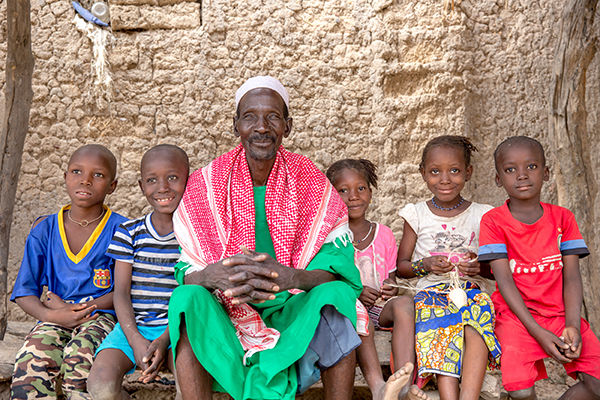This article was updated on October 10, 2019.
Our founder, Conrad N. Hilton, was credited with saying, “When you start planting acorns, the full-fledged oak may take ten years. And I was beginning to learn what all gardeners must know – patience.” At the Conrad N. Hilton Foundation, we are guided by our founder’s philosophy in many different areas of our work, from our cultural values to our philanthropic approach.
Conrad Hilton was also a self-described dreamer, and he urged people to “Think Big. Act Big. Dream Big.” When the Hilton Foundation’s work in avoidable blindness began 20 years ago, the Foundation’s leaders chose to channel our founder’s approach, by “thinking big” and making a big bet in an under resourced area: eliminating avoidable blindness caused by trachoma, an infectious neglected tropical disease. With an initial investment of $20 million paid over 10 years, the Foundation became a leading voice in this space.
The burden of trachoma among affected individuals and communities is enormous. The economic cost in terms of lost productivity from blindness and visual impairment is estimated at up to $5.3 billion annually. Unable to see, blind individuals cannot participate in the workforce and oftentimes require family members to assist them with their daily activities. A disability that is challenging in any context, blindness can be truly devastating in the developing world where an individual’s life expectancy is, on average, reduced by one-third. Trachoma affects the most vulnerable and isolated in our society, those without access to adequate sanitation or hygiene, and disproportionately impacts women and girls, who are four times more likely to require surgery than their male counterparts.
The heartbreaking reality of this disease has inspired us to persevere in our effort for more than 20 years. Since 1997, the Foundation has committed nearly $77 million to the cause, increasing the profile of eliminating avoidable blindness and encouraging other donors to join in the fight. For every dollar that the Foundation has put towards this portfolio, a partner organization has provided an additional dollar and a half to fund the initiative, multiplying our investment. Additionally, we have been major supporters of critical programs such as The Carter Center’s Trachoma Control Program and the International Trachoma Initiative. Through collaborations like Trachoma Free Africa, the Foundation has leveraged the expertise and funding of institutions such as the Queen Elizabeth Diamond Jubilee Trust, US Agency for International Development, the UK Department for International Development, Lions Club International Foundation, and others.
The impact of the Foundation’s leadership can be seen in this fight as we are moving the needle closer to global elimination. Of the countries where we have funded programs, Ghana, Morocco and most recently Cambodia have already reached their elimination goals. Three more countries, Mali, Niger and Tanzania, are on track to achieve their goals. At celebrations for World Sight Day in Mali and Niger, the national eye health programs of both countries will kick off the next phase in this effort with partner organizations The Carter Center, Helen Keller International and Sightsavers. The remarkable progress achieved by these programs, and the role that the Foundation’s funding has had to take these programs to scale, has been a critical factor in attracting and retaining new donors for the global fight to eliminate trachoma. It has shown that the fight against trachoma could actually be winnable.

Guided by our founder’s personal philosophy, this long-term perspective on taking bold risks that can potentially lead to positive world-changing outcomes is at the heart of the Foundation’s grantmaking. Nowhere is it better exemplified than in our commitment to addressing the needs of the most vulnerable and disadvantaged disproportionately affected by the curse of avoidable blindness. As staff, we are proud to continue the trajectory set forth by our founder, in the hopes that one day the world will be completely rid of trachoma, a disease that has plagued humans for millennia.